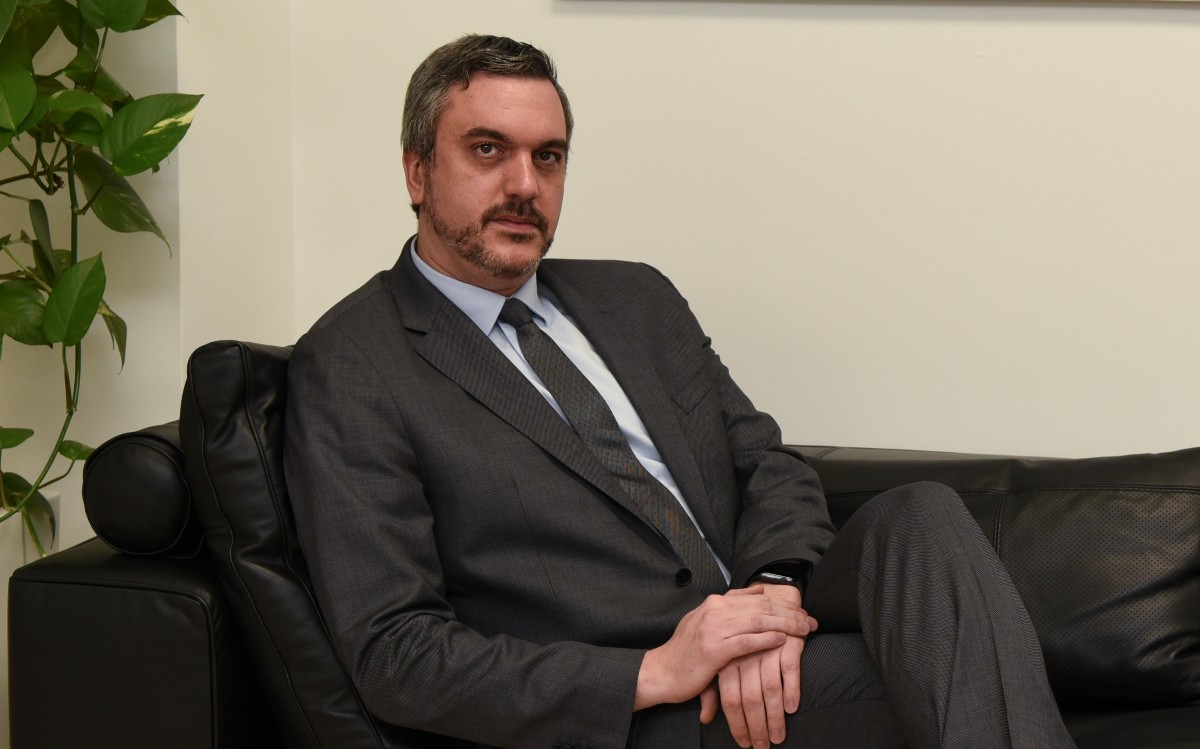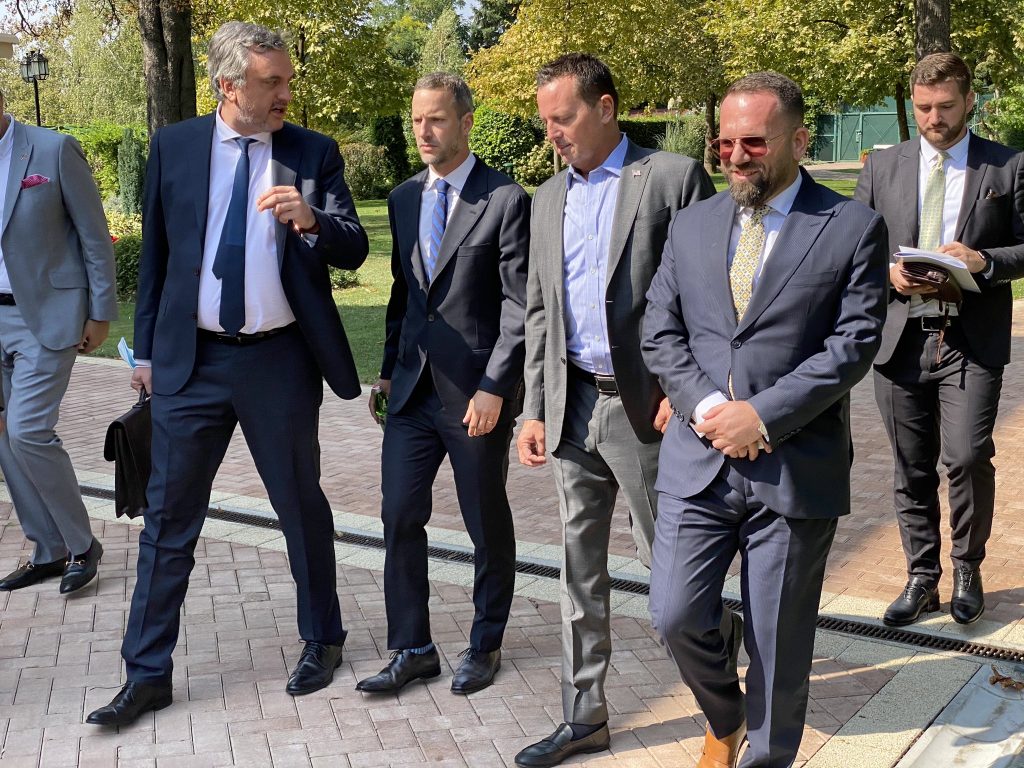This year’s economic indicators, as well as excellent forecasts for 2021, which predict the growth of up to six per cent, speak of our success in responding to the crisis.
In an interview for the October issue of Diplomacy & Commerce magazine, the President of the Chamber of Commerce and Industry of Serbia (CCIS), Marko Čadež, speaks about the economic environment in Serbia, the benefits that opening of a DFC office in Belgrade will bring to large and small companies in Serbia, the opening of a CCIS office in Jerusalem, putting a joint team with the Pristina Chamber of Commerce and the CCIS’ projects such as “Moja Prva Plata” and “Čuvarkuća”.
How important is DFC’s arrival in Serbia and the opening of their regional office in Belgrade?
The opening of the DFC regional office in Belgrade and an American delegation’s talks with the representatives of the business community and state institutions regarding very specific projects mean that the implementation of the so-called Washington agreement has practically begun at an unprecedented speed, i.e. only three weeks after signing a document that is important not only for Belgrade and Pristina but for the whole region.

It is precisely the speed with which the implementation of what was agreed and signed began and which the business community always insists on, is what makes me especially happy and encouraged. It is up to us to make the best out of the opportunities that are open to us with this agreement, to prepare and implement projects as quickly as possible, so that businesses and citizens feel progress as soon as possible.
What will all of this bring to the Serbian economy and in which areas do you expect the biggest investments to be made?
This will very quickly bring very concrete, visible and tangible benefits. Thanks to the guarantee scheme, the small and medium-sized enterprises will have better access to financing, i.e. to cheaper loans which will be more favourable than those granted for mitigation of the consequences of the pandemic. The possibility of granting a special credit line was also considered. The private sector, companies from production and service activities – from energy and security, through the food industry and logistics to IT and high technologies, can count on support in the implementation of their investment projects by applying for funding from the American Development Bank and its partners. Representatives of about 30 companies from Serbia talked about this with the representatives of American financial institutions during their visit to Belgrade. These are innovative, economically viable, profitable projects, strategically important for the economy, growth and connecting the entire region, on which the Chamber of Commerce and Industry has been working for the past eight months while maintaining constant communication with companies and the DFC.
Of course, the biggest investments are expected to be made in large-scale, infrastructural projects, such as the construction of the Nis-Pristina motorway, the construction and modernization of the railway on the northern and eastern branches in the direction of Pristina, and connecting it to the port of Durres on the Adriatic coast. These projects are important for the economy, because of all the benefits that infrastructure development brings is a prerequisite for stronger economic cooperation, greater competitiveness and more efficient business. They will also facilitate the formation of the so-called Mini Schengen, a common market and free movement of people, goods, services and capital zone of the common market which will be formed by Serbia, North Macedonia, Kosovo and Albania.
“We have proposed a whole set of measures to alleviate the problems caused by reduced demand in the domestic and foreign markets”
Will a new formed joint team for cooperation with the Kosovo Chamber of Commerce. accelerate the development of the economy and exchange?
The projects envisaged by the Washington agreement that the DFC will support are important for our member companies, but also for the development of the entire region, as well as for stronger regional economic connections, which they are committed to and are already working on together.
Our goal is for the joint team, formed by the two chambers, to actively involve the business community and to help all participants in the process of economic normalization with more efficient implementation of these projects. The team will work under the auspices of the two chambers, have offices in Belgrade and Pristina, and will be composed of business leaders and experts for economic normalization. Furthermore, special groups will be formed to consider, monitor and develop sectoral and individual projects.
CCIS representative office is opened in Margalit Startup City in Jerusalem. What will be the focus of economic cooperation between Israel and Serbia?
This is a joint office of the Serbian government and the Chamber of Commerce and Industry of Serbia, which will focus on the development of economic cooperation with Israel, especially in the field of innovation. We highly value Israel’s experiences and guidelines as one of the most innovative economies, home to leading start-ups and most advanced technological nations in the world. Considering the know-how, skills and experience of Israeli companies and organizations such as Startup Nation, as well as their investment funds like Jerusalem Venture Partners (JVP), I am confident that all of it will contribute to the further expansion of the start-up community in Serbia while connecting our digital communities and developing innovative companies in Serbia. After the meetings I had in Tel Aviv and Jerusalem with representatives of institutions, business organizations and companies, we are regularly communicating with Israeli partners to exchange the necessary information and define future joint activities.
Of course, there is room for cooperation in other areas as well, for example in the food industry, through investments in production with the view of jointly breaking into third markets, which is one of the possibilities we marked at the recent meeting with the Israeli ambassador in Belgrade.
“More than 10,000 companies have applied to participate in the programme, which have announced about 17,000 available job positions”
What are the goals of the “My First Salary” (Moja Prva Plata) project and what kind of response did the project get, considering that the application deadline was September 25th?
More than 10,000 companies have applied to participate in the programme, which have announced about 17,000 available job positions for more than 28,000 workplaces, for which young people will be able to apply from October 8th. The response of businesses, whether large companies, small business owners, micro, small and medium-sized enterprises from all parts of Serbia, has far exceeded all expectations. This speaks volumes about their staffing needs but also about the importance of this project, not only for young people, who are given the chance to work for companies and have their first work experience but also for employers from the private, public and civil sectors. They now have the opportunity, with the help of the state which provides training compensation to young people during the project implementation, to hire educated, quality staff who will they train according to their needs and criteria for specific jobs and then hire all or the best of them thus obtaining needed workers and rejuvenating their work teams.
Is the state planning to grant a new set of aid by the year-end considering that the previous two sets were well-received and preserved the health of the economy?
The first spring set of financial aid and additional linear and sectoral measures implemented in July and August helped businesses to maintain their liquidity, to regularly settle other obligations, not to lay off workers, to keep their suppliers, to get new deals and be more financially relaxed. This year’s economic indicators, as well as excellent forecasts for 2021, which predict the growth of up to six per cent, speak of our success in responding to the crisis. Investors, both domestic and foreign, who continued to invest in Serbia, have recognized that. The country’s credit rating was confirmed, with good prospects that Serbia will be the first country in the region to cross the investment threshold and join the countries that are capable of attracting long-term investments oriented towards technologically intensive production, which brings higher added value.
In the meantime, we have proposed and discussed with the line ministries a whole set of measures to alleviate the problems caused by reduced demand in the domestic and foreign markets, further relax the economy and provide companies with better access to finance. I believe this will be the first topic to discuss with the new government and that relevant decision will be made very soon.

The Čuvarkuća project has exceeded expectations. How important is this project especially in the current economic circumstances?
When we started preparing the Made in Serbia project at the end of last year, we could not even assume that the project would be so relevant this year, i.e. more relevant than ever before and that it would provide support to domestic production more than ever before. By giving the right to use the collective trademark Čuvarkuća, we support companies, regardless of domestic or foreign, which have production in Serbia, hire local suppliers and workers, make healthy and above-average quality products from domestic ingredients and use domestic intelligence and innovation. We reward producers who meet all of these criteria with the Čuvarkuća trademark and we encourage other companies to be the bearers of this trademark which is proof for customers that these products are of both domestic origin and above-average quality.
So far, almost 360 products have been candidates for these trademarks, mostly from the food industry, but also from the metal processing, textile, construction material and pharmaceutical industry. A total of 268 products bear this label, and in the next month, we expect to decide on 90 more products.
DFC in Belgrade
By supporting projects, fostering the economic approach to solving problems, showing readiness to help the processes of normalization of relations and the efficiency with which it has committed itself, the US administration has sent a great message to the American and the international business community that Serbia and the region are worth their investments.